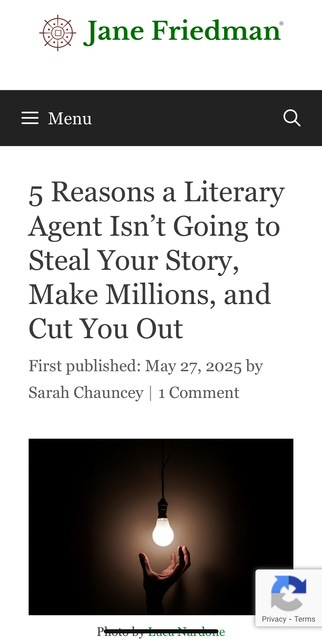Relax, No One is Trying to Steal Your Book Idea
On writing, creative fears, and the fear of missing out (on profits)
Twenty years ago, when I sent my memoir manuscript to an editor, I typed CONFIDENTIAL in all-caps across the header and footer—three times in each location, just in case someone didn’t get that this manuscript was mine, mine, mine.
A decade earlier, I’d mailed a spec script to myself in a plain brown envelope, convinced that this would prove that I wrote it first—should I ever need such proof. Although the spec was well received, only a handful of people ever read that script, and my worry was totally unnecessary.
We creatives have a tendency towards anxiety, in part because so many of us are highly sensitive. We may have been bullied or abused for that trait as children, which means we carry trauma residue into our adult professional lives. And the writing life itself is rife with opportunities for anxiety.
Yet rarely do we stop to inquire about whether our anxieties are rooted in logic, or whether they’re our ego trying to make us feel simultaneously important and miserable. In my case, it was the latter.
Plagiarism does happen, of course. By definition, though, plagiarism is the theft and re-use of existing published material. An idea can’t be protected by copyright; only a particular execution of that idea can. More about that later.
Synchronicity happens
Last year, a popular and highly respected writer ranted about how a humourous observation they’d posted had been stolen and was whipping around the Internet in a variety of GIFs and memes. Indeed, I’d seen variations on the same sentence at least a dozen times—including several months before this writer had posted their version. I didn’t say anything, because I don’t really know this writer, and I’ve learned that trying to reason people out of their outrage is a losing battle.
About two months later, I was watching an old episode of the Allison Janney sitcom Mom, an episode from 2017 or 2018… and a character made the exact same joke, word for word. Were all these people stealing from the writers of Mom and reviving an eight-year-old one-liner? Or was this relatively low-hanging fruit on the comedy tree, and therefore a relatable observation likely to be made by numerous people?
I was fairly sure from the beginning that the writer’s belief was a story rather than fact, because this writer is known for serious literary writing, not humour. In the comedy world (and especially the online comedy world), lines and entire bits are stolen frequently—from other comics. I have no doubt the various comedy accounts were stealing and repackaging that meme from each other. But it’s highly unlikely that a comedy influencer is stalking the account of a serious literary novelist for witty bits to steal. That’s a Venn diagram with little overlap.
We all like to believe we come up with completely unique ideas, but here’s the thing: It’s not the idea that makes something special. It’s the execution. It took me a long time to accept that, because ideas are so much easier to generate (and honestly, a lot more fun) than putting in the work to achieve a fully realized creative work.
Just because a story is similar doesn’t mean it’s theft
Twenty years ago, I spent five years writing and revising an earnest memoir about a two-month cruise I took with my father, when he was 95 and I was 33; the trip was the longest period of time we’d ever spent together, and it forced us to confront old dynamics.
When I hired the highest-level freelance editor I could afford, her feedback boiled down to: “You’ve written the wrong story. This is a dark comedy.” She was right. As Vivian Gornick writes in The Situation and the Story, out of endless facts of a given timeline, there are hundreds of potential stories. I’d told the story in a sincere voice, which influenced the scenes I included and how I developed the characters and arcs. That was an easy, straightforward approach, but it wasn’t the most compelling.
At the time, I was struggling financially, so I prioritized writing that would help me pay the rent. I abandoned the memoir.
In 2018, a movie called Like Father came out, starring Kristen Bell and Kelsey Grammer as an estranged father-daughter duo who take a long cruise together and reconcile. Like Grammer’s character, my father had been a high achiever, which created challenges for me, just as it did for Bell’s character.
Although I was a film critic for years, there is zero chance that screenwriters Anders Bard and Lauren Miller Rogan somehow found my abandoned manuscript and decided to adapt the story as a screenplay.
Relax, no agent or editor will steal your story
New writers may not understand just how few authors make money from their books. They may hold onto that fantasy in order to give them the motivation to continue writing or revising (pro tip: find a reason other than money to get your work out).
The belief that other authors are making a fortune can lead to the fear that other people will take our ideas and make the big money that we believe should rightfully be ours. Yet that fear is rooted in a false premise. As I wrote in my lastest post for Jane Friedman:
“Anxiety can arise for writers in many different ways across the span of a career. For those querying their debut, it often manifests as fear someone will steal their story idea or full manuscript. The anxiety and fear are real and painful emotions, yet it may be reassuring to know this is not an actual threat.”
—Sarah Chauncey, from “5 Reasons a Literary Agent Isn’t Going to Steal Your Story, Make Millions, and Cut You Out”.
In the post, I explain a particular clause that freaks out new writers, how copyright works, and why agents won’t steal ideas from potential clients.
I end the article by assuring readers that there are enough stories—and one-liners—for all of us. We don’t need to be as petty as I was twenty or thirty years ago, or as fearful as many of us are. (Granted, the world is pretty scary right now, but if we displace that stress onto our creative work, we’re just piling on ourselves.)
Thank you for being a Resonant Storytelling subscriber. I realize you’re probably swamped with emails, and that makes it all the more meaningful that you took the time to read this. If you found this post helpful, here are four simple ways to support this Substack:
Subscribe to this Substack, if you don’t already
Upgrade to a paid subscription (you’ll be supporting a Canadian 🇨🇦!)
Click or tap the heart icon to like this post
Share this post by ‘restacking’ (use the ‘quote’ function to say what helped you the most about this post)
Forward this email to a friend or share the link on social media





